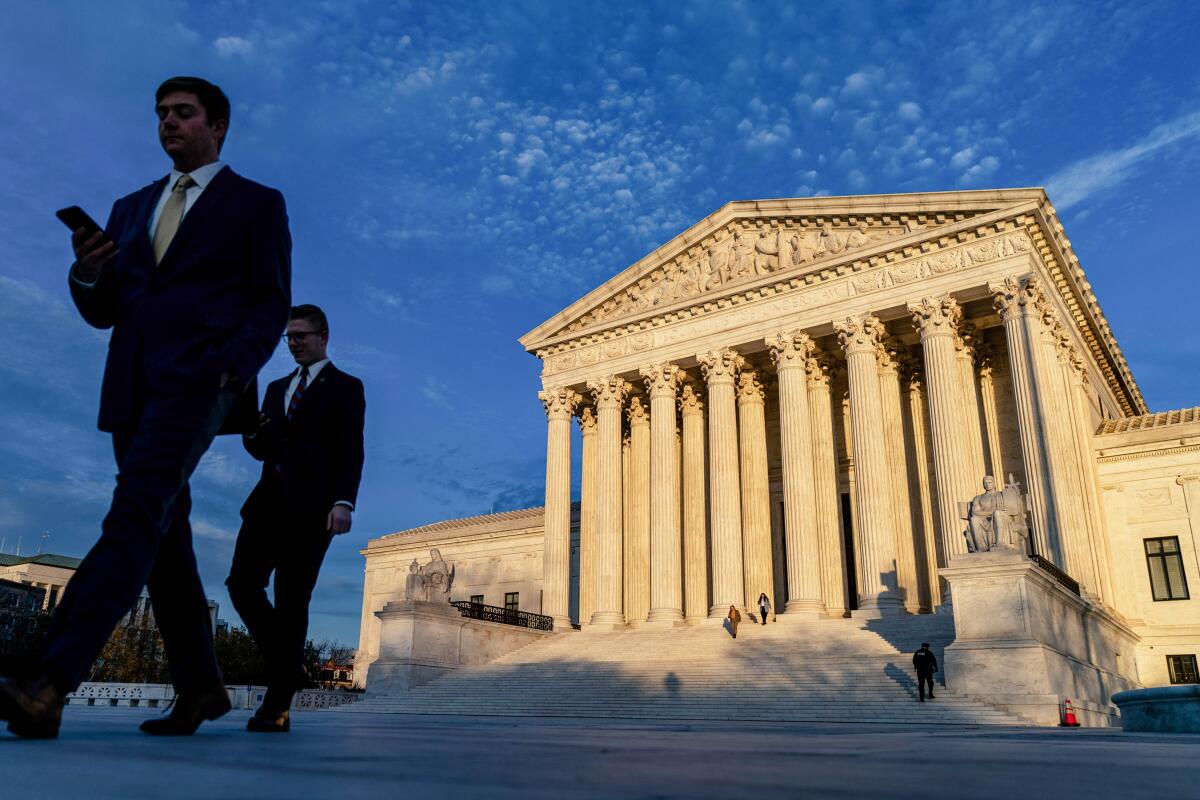Supreme Court leans in favor of requiring taxpayer funding for some religious schools

- Share via
WASHINGTON — Supreme Court justices sounded ready Wednesday to rule for a Maine couple seeking state taxpayer funds to send their children to a church-sponsored school because no public ones are available in their area.
The case of Carson vs. Makin poses the latest test of the line between church and state, and it comes at a time when the court’s conservatives have increasingly sided with religious discrimination claims. Last year, the high court ruled for Montana parents who sought a state scholarship to send their children to a Christian school.
A ruling in favor of the Maine parents could open the door to arguments that states may not exclude private religious charter schools if they also fund nonreligious ones.
The Maine case centers on whether the state can refuse to pay for Christian schools for students who live in rural communities that don’t have a public high school.
For 40 years, the state has said it will pay the cost to send those children to a private school, but not one that is affiliated with a church and teaches religion.
That is “discrimination against religion, and it is unconstitutional,” argued Michael Bindas, an attorney for the Virginia-based Institute for Justice.
The parents “want an education that aligns with their sincerely held religious beliefs,” he said. “This is a school choice program,” and “parents have a constitutional right to send their children to a religious school.”
The three liberal justices objected to his religious-discrimination argument, but none of the six conservatives did so.
“What is the discrimination?” asked Justice Sonia Sotomayor. “I think all parents in Maine are given the chance to send their children to free public secular schools. That’s what they’re promised.”
But Justice Brett M. Kavanaugh said the discrimination was obvious.
“Say, two neighbors in Maine in a neighborhood where a public school is not available,” he said. “The first neighbor says: We’re going to send our children to a secular private school. They get the benefit. The next-door neighbor says: Well, we want to send our children to a religious private school. And they’re not going to get the benefit. That’s just discrimination on the basis of religion right there at the neighborhood level.”
Lawyers for Maine and the Biden administration, agreeing with Sotomayor, said the state and its taxpayers want to pay for a public education and should not be forced to pay for religious instruction.
Maine Chief Deputy Atty. Gen. Christopher Taub said the state offers every child a “free public education” that is “neutral” toward religion and “promotes tolerance” of different faiths. By contrast, he said, the parents seek “an entirely different benefit: instruction designed to instill religious beliefs at public expense.”
Deputy Solicitor Gen. Malcolm Stewart said the Constitution’s protection for religious freedom does not require the state to “subsidize” religious schools.
He disagreed with Kavanaugh’s example of the two neighbors. That is “not discrimination based on the religion of the parents,” he argued, but instead reflects the state’s choice on what to fund.
“To decline to fund religious instruction while you are funding secular instruction” is not a form of discrimination, he said.
In decades past, the court had held the Constitution calls for a strict separation of church and state, which in turn meant that taxpayer funds may not flow to religious schools.
But in recent years, the court’s conservatives have argued that excluding church schools from public funds discriminates against religion.
Advocates of church-state separation were troubled by Wednesday’s arguments.
“The court’s conservative justices may be poised to turn America’s foundational principle of religious freedom on its head,” said Rachel Laser, president of Americans United for Separation of Church and State. It has “never been understood as requiring the government to fund religious education, but several justices seemed prepared to reinterpret it to mandate exactly that.”
Diana Thomson, lawyer for the religious rights nonprofit Becket Fund for Religious Liberty, said the court must “stop Maine from treating religious people like second-class citizens. Imagine thinking it is fair for privileged students attending elite out-of-state boarding schools to reap the benefits of tuition assistance, but not economically disadvantaged kids wanting to attend their local religious school down the road.”
If the court rules for the parents in Maine, the next question will be the limits of this nondiscrimination rule. Does it apply only to special state scholarships and tuition grants, or could it apply broadly, including to charter schools that can be privately owned but publicly funded?
Experts in education law say the next battleground will be charter schools, which have been growing in California and in many parts of the nation as privately run, taxpayer-funded alternatives to traditional public schools.
Notre Dame law professor Nicole Garnett predicted there would be a move to permit religious charter schools, either through the courts or the states.
If these “charter school programs are properly considered programs of private school choice,” they can take advantage of a high court ruling forbidding the exclusion of religious schools, she said.
More to Read
Get the L.A. Times Politics newsletter
Deeply reported insights into legislation, politics and policy from Sacramento, Washington and beyond. In your inbox twice per week.
You may occasionally receive promotional content from the Los Angeles Times.











